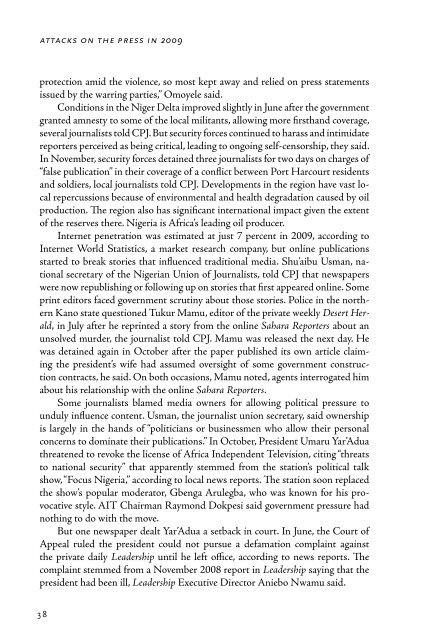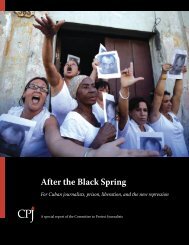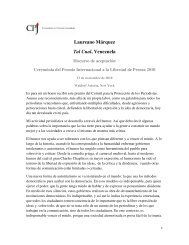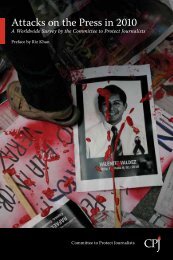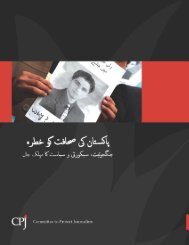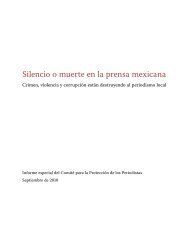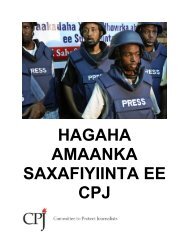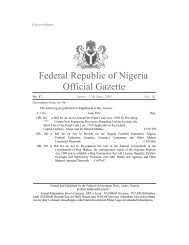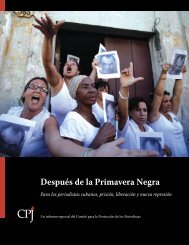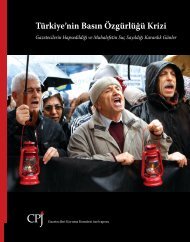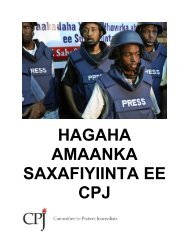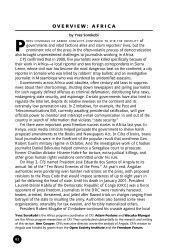Attacks on the Press - Committee to Protect Journalists
Attacks on the Press - Committee to Protect Journalists
Attacks on the Press - Committee to Protect Journalists
- No tags were found...
You also want an ePaper? Increase the reach of your titles
YUMPU automatically turns print PDFs into web optimized ePapers that Google loves.
attacks <strong>on</strong> <strong>the</strong> press in 2009africa: somaliaprotecti<strong>on</strong> amid <strong>the</strong> violence, so most kept away and relied <strong>on</strong> press statementsissued by <strong>the</strong> warring parties,” Omoyele said.C<strong>on</strong>diti<strong>on</strong>s in <strong>the</strong> Niger Delta improved slightly in June after <strong>the</strong> governmentgranted amnesty <strong>to</strong> some of <strong>the</strong> local militants, allowing more firsthand coverage,several journalists <strong>to</strong>ld CPJ. But security forces c<strong>on</strong>tinued <strong>to</strong> harass and intimidatereporters perceived as being critical, leading <strong>to</strong> <strong>on</strong>going self-censorship, <strong>the</strong>y said.In November, security forces detained three journalists for two days <strong>on</strong> charges of“false publicati<strong>on</strong>” in <strong>the</strong>ir coverage of a c<strong>on</strong>flict between Port Harcourt residentsand soldiers, local journalists <strong>to</strong>ld CPJ. Developments in <strong>the</strong> regi<strong>on</strong> have vast localrepercussi<strong>on</strong>s because of envir<strong>on</strong>mental and health degradati<strong>on</strong> caused by oilproducti<strong>on</strong>. The regi<strong>on</strong> also has significant internati<strong>on</strong>al impact given <strong>the</strong> exten<strong>to</strong>f <strong>the</strong> reserves <strong>the</strong>re. Nigeria is Africa’s leading oil producer.Internet penetrati<strong>on</strong> was estimated at just 7 percent in 2009, according <strong>to</strong>Internet World Statistics, a market research company, but <strong>on</strong>line publicati<strong>on</strong>sstarted <strong>to</strong> break s<strong>to</strong>ries that influenced traditi<strong>on</strong>al media. Shu’aibu Usman, nati<strong>on</strong>alsecretary of <strong>the</strong> Nigerian Uni<strong>on</strong> of <strong>Journalists</strong>, <strong>to</strong>ld CPJ that newspaperswere now republishing or following up <strong>on</strong> s<strong>to</strong>ries that first appeared <strong>on</strong>line. Someprint edi<strong>to</strong>rs faced government scrutiny about those s<strong>to</strong>ries. Police in <strong>the</strong> nor<strong>the</strong>rnKano state questi<strong>on</strong>ed Tukur Mamu, edi<strong>to</strong>r of <strong>the</strong> private weekly Desert Herald,in July after he reprinted a s<strong>to</strong>ry from <strong>the</strong> <strong>on</strong>line Sahara Reporters about anunsolved murder, <strong>the</strong> journalist <strong>to</strong>ld CPJ. Mamu was released <strong>the</strong> next day. Hewas detained again in Oc<strong>to</strong>ber after <strong>the</strong> paper published its own article claiming<strong>the</strong> president’s wife had assumed oversight of some government c<strong>on</strong>structi<strong>on</strong>c<strong>on</strong>tracts, he said. On both occasi<strong>on</strong>s, Mamu noted, agents interrogated himabout his relati<strong>on</strong>ship with <strong>the</strong> <strong>on</strong>line Sahara Reporters.Some journalists blamed media owners for allowing political pressure <strong>to</strong>unduly influence c<strong>on</strong>tent. Usman, <strong>the</strong> journalist uni<strong>on</strong> secretary, said ownershipis largely in <strong>the</strong> hands of “politicians or businessmen who allow <strong>the</strong>ir pers<strong>on</strong>alc<strong>on</strong>cerns <strong>to</strong> dominate <strong>the</strong>ir publicati<strong>on</strong>s.” In Oc<strong>to</strong>ber, President Umaru Yar’Aduathreatened <strong>to</strong> revoke <strong>the</strong> license of Africa Independent Televisi<strong>on</strong>, citing “threats<strong>to</strong> nati<strong>on</strong>al security” that apparently stemmed from <strong>the</strong> stati<strong>on</strong>’s political talkshow, “Focus Nigeria,” according <strong>to</strong> local news reports. The stati<strong>on</strong> so<strong>on</strong> replaced<strong>the</strong> show’s popular modera<strong>to</strong>r, Gbenga Arulegba, who was known for his provocativestyle. AIT Chairman Raym<strong>on</strong>d Dokpesi said government pressure hadnothing <strong>to</strong> do with <strong>the</strong> move.But <strong>on</strong>e newspaper dealt Yar’Adua a setback in court. In June, <strong>the</strong> Court ofAppeal ruled <strong>the</strong> president could not pursue a defamati<strong>on</strong> complaint against<strong>the</strong> private daily Leadership until he left office, according <strong>to</strong> news reports. Thecomplaint stemmed from a November 2008 report in Leadership saying that <strong>the</strong>president had been ill, Leadership Executive Direc<strong>to</strong>r Aniebo Nwamu said.SOMALIASomalia was am<strong>on</strong>g <strong>the</strong> world’s deadliest countries in 2009,surpassing violent hot spots such as Iraq and Pakistan. As c<strong>on</strong>flict c<strong>on</strong>tinuedbetween <strong>the</strong> weak Transiti<strong>on</strong>al Federal Government and multiple insurgentgroups, nine journalists were killed in direct c<strong>on</strong>necti<strong>on</strong> <strong>to</strong> <strong>the</strong>ir work, seven of<strong>the</strong>m in <strong>the</strong> volatile capital, Mogadishu. An exodus of local journalists c<strong>on</strong>tinuedthroughout <strong>the</strong> year, and few internati<strong>on</strong>al journalists dared travel in<strong>to</strong> <strong>the</strong> countryfor firsthand reporting, according <strong>to</strong> CPJ research. As a result, <strong>the</strong> amount andquality of news coverage of Somalia’s political and humanitarian crisis sufferedgreatly, CPJ found.Sheikh Sharif Sheikh Ahmed, c<strong>on</strong>sidered a moderate Islamic politician, waselected president in January after peace talks in Djibouti, but <strong>the</strong> vote did little <strong>to</strong>foster peace. The two main insurgent groups, Al-Shabaab and Hisbul Islam, accusedSharif of being a puppet of Western governments. Al-Qaeda leader Osamabin Laden denounced <strong>the</strong> new president in a recorded statement in March andurged militant groups <strong>to</strong> <strong>to</strong>pple him, according <strong>to</strong> news reports. Al-Shabaab,which has reported links <strong>to</strong>Al-Qaeda, <strong>to</strong>ok c<strong>on</strong>trol ofmost of sou<strong>the</strong>rn Somalia byMay, including areas within amile of <strong>the</strong> presidential palacein Mogadishu.Twenty-<strong>on</strong>e journalistswere killed in Somalia between2005 and 2009, but<strong>on</strong>ly about half died in crossfireduring combat situati<strong>on</strong>s.The o<strong>the</strong>rs were targeted byassassins and murdered. Ast o p developments»»Al-Shabaab terrorizes media throughviolence, threats, censorship.»»Many local journalists flee in<strong>to</strong> exile,leaving a void in coverage.9key statistic<strong>Journalists</strong> killed in direct relati<strong>on</strong> <strong>to</strong><strong>the</strong>ir work in 2009.insurgents drew ever closer <strong>to</strong> <strong>the</strong> capital in 2009, c<strong>on</strong>diti<strong>on</strong>s for journalists <strong>the</strong>rec<strong>on</strong>tinued <strong>to</strong> deteriorate, particularly in <strong>the</strong> volatile Bakara Market district wheremajor media houses Radio Shabelle and HornAfrik radio were based. “They willkill a journalist simply for being a journalist,” said Farhan Ali, who served as ministerof informati<strong>on</strong> during a porti<strong>on</strong> of 2009, part of an ever-changing cast offederal government officials.The press faced grave dangers from multiple sources. On <strong>the</strong> first day of2009, Shabelle reporter Hassan Mayow was shot twice in <strong>the</strong> head by suspectedgovernment soldiers in Afgoye, a <strong>to</strong>wn roughly 25 kilometers (15 miles) west ofMogadishu. According <strong>to</strong> local journalists who witnessed <strong>the</strong> murder and spoke3 83 9


